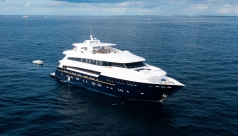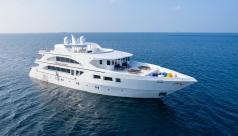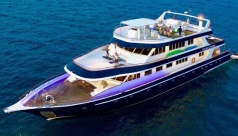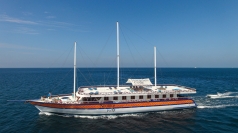The Climate and Best Time to Visit
There are 2 monsoon seasons which dominate the climate here - the northeast monsoon (dry) and the southwest monsoon (wet). Due to its equatorial location, the Maldives do not experience major cyclones. Generally speaking the drier months of the year are between November and April (March and April being the hottest months). The wetter season, runs from May to early November. June, July and August often see the most rain, although most of the rain is experienced in the southern atolls. Air temperatures are consistent and range between 24 and 33°C. You should pack appropriate clothing such as light cotton garments and sandals and otherwise as you normally would for visiting somewhere in the tropics.
It is possible to dive the Maldives throughout the year, with warm water temperatures being fairly constant throughout the year at 26-29°C (except in the far south which can be a couple of degrees cooler). However, the recommended season for confirmed liveaboard cruise departures is from November to May. This is when the seas are calmest and the skies are most often blue, with peak visibility. Discover the ideal times to dive the top sites in our detailed Maldives dive guide.
Ports of Departure and How to Get There
Male International Airport on Hulhule Island, 10 minutes by boat from the capital city Male, is where most arrivals first set foot on Maldivian soil. It is well connected and easy to get to. The islands are 4 hours flight from Singapore, around 13 hours from London, and 3 hours from Dubai. Colombo, the capital city of Sri Lanka, is some 45 minutes flight away. There is an Airport Development Charge for all passengers above 2 years of age departing from Male airport, collected at the check-in counters.
The major airlines that fly there from the UK include Air Emirates, Sri Lankan Airlines, Qatar Air and Thomson. Air Italy, Air Europe, Eurofly and Lauda Air all connect Italy with the Maldives. Condor and LTU fly from Germany. Other European airlines include Edelweiss (Switzerland), Iberoworld Airlines (Spain) and Aeroflot (Russia).
The main Asian airlines provide flights into Male from various destinations, so check Air Asia, Singapore Airlines, Malaysia Airlines, Qatar Airways and Emirates for details. Divers from China can fly via Singapore or Kuala Lumpur, or direct from Macau with Viva Macau. Indian visitors can fly direct with Air Sahara or Indian Airlines.
If coming from the U.S. of A, it is most convenient to fly via Singapore and take the 4 hour flight from there. There are also regular flights from New York and Los Angeles via Dubai with Air Emirates.
Departure ports are detailed for each trip in the 'Departure Schedule & Prices' section in each of our Maldives liveaboard boat pages. They will also be sent to you during the inquiry and booking process. In some cases a boat may only depart the area the day after the trip begins. This means you can arrive quite late on the first day and still board before it sets sail the following morning.
For complete protection, we strongly recommend travel insurance covering scuba diving and trip cancellation. Our trusted partners offer competitive dive-specific policies. Get your instant quote today:

Places to Stay
Book Maldives hotels before/after your liveaboard safari at HotelsCombined.com. Browse options, chat online with experts, and reserve instantly. All bookings include a Low Price Guarantee for the best value:

Need a Male stopover? Day rooms at airport hotels offer showers, luggage storage, and city access - perfect between travel.










































